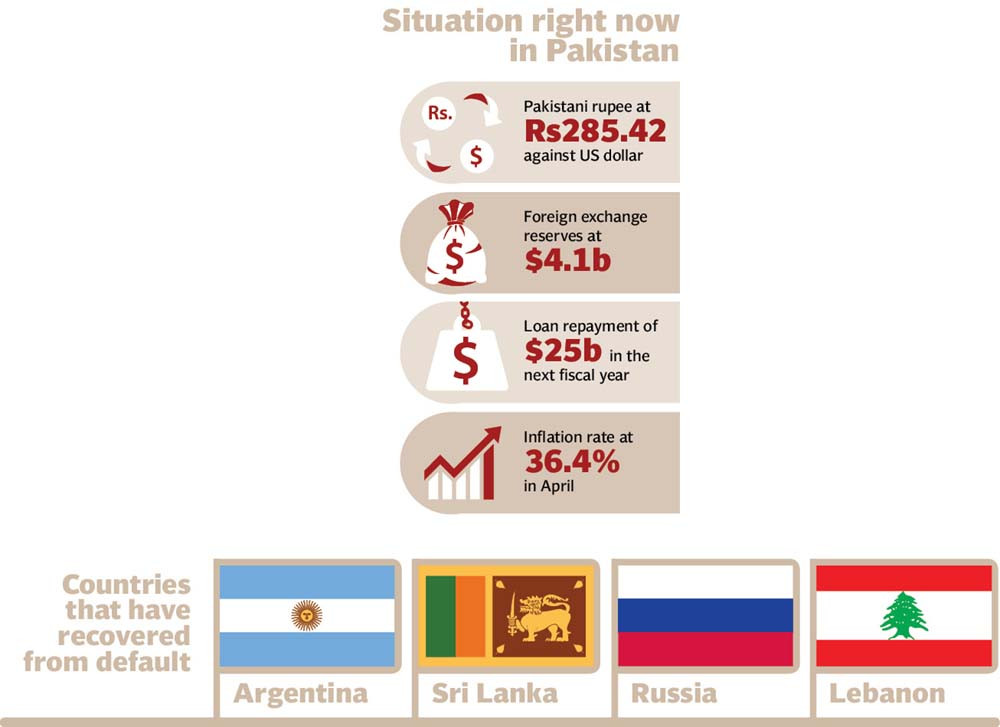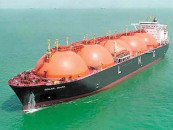What happens if Pakistan defaults on debt?
Looming default can spark shortages of food, medicines, and fuel, as Pakistanis face devastating consequences

Catastrophic economic and social crises await Pakistanis in the event of a sovereign default, which may result in shortages of food, medicines, fuel, and the cash needed to import and purchase these essential goods.
Very little time remains for Prime Minister Shehbaz Sharif to make a swift decision on whether to proceed with his plans to unveil a popular budget that would further antagonise international creditors. His second and only option should be to find a long-term durable economic revival framework, which is now a prerequisite to avert the looming default.
We hope that the government will be able to steer the economy out of the crisis and avoid default. However, in the case of a sovereign default, people will lack sufficient money to purchase consumable goods, and the government and private importers will require hard cash to import everything from pulses to medicines and from crude oil to cooking oil.
The government’s revenues will be consumed by interest payments and high costs, while hyperinflation, following a sovereign default, will erode the purchasing power of the common man’s salary.
Pakistan is not unique in this regard, despite its leaders proudly claiming that it has never defaulted except on one occasion.
Sri Lanka also defaulted in April last year for the first time in its history amid extreme political and economic crises. Similar factors are currently present in Pakistan and are gradually pushing it toward a default situation.
Since 1961, approximately 147 governments have defaulted on their sovereign debt. Recent examples include Argentina, Sri Lanka, Russia, and Lebanon, according to KTrade, a research engine of KASB.
“Restaurants in the capital, Colombo, are full and markets well stocked. Travels around the central mountain region and the small villages are also deceptive,” wrote Zeinab Badawi in the Financial Times this February.
A similar deceptive situation exists in Islamabad, where policymakers and urban elites believe that the country will not default.
According to JP Morgan Chase Bank’s analysis on May 19, Pakistan is likely to have sufficient external liquidity to cover financing needs until June. However, default risks increase significantly in fiscal year 2023-24. The analysis further noted that “at some point in the second half of 2023, Pakistan faces the material risk of running out of usable reserves to meet foreign obligations.”
Finance Minister Ishaq Dar denies that Pakistan carries a high risk of default.
For many, Sri Lanka has become an extreme example of the consequences excessive borrowing can have on vulnerable countries. Pakistan’s situation is no different.
Pakistanis are said to be resilient, just like the Sri Lankans who, according to the Finance Times, “now seethe with anger.”
Pakistan’s foreign exchange reserves are dangerously low, standing at just $4.1 billion, which is equivalent to the debt repayments due in June alone.
Catastrophe awaits Pakistanis
If the government fails to make adequate arrangements to repay the $25 billion debt in the next fiscal year, with or without the support of the International Monetary Fund (IMF), the people of Pakistan will experience a way of life they have never known.
Living standards for 250 million people will collapse. Shortages of food, fuel, and medicines, already scarce due to import restrictions imposed by the Sharif administration to delay default, will worsen. The value of the rupee will continue to shrink, leading to hyperinflation caused by the exchange rate movement. The government may be forced to impose cuts on imports, which could harm companies relying on imported raw materials.
Sovereign default inflicts significant economic instability, erodes investor confidence, and hinders access to international financial markets, as stated by Arif Habib Research last week. The lack of breakthrough with the IMF, whose approval often determines support from friendly countries, increases the likelihood of sovereign default.
Currency crash
In the event of a default, the main casualty will be the rupee, which has already fallen to as low as Rs313 to a dollar in the open market.
The price of the rupee against the US dollar will become unpredictable, as many individuals scramble to acquire remaining foreign currency.
Cash will be required for all purchases from abroad, and no bank will open credit accounts.
Before the default, the Sri Lankan rupee was around 200 to a dollar. It fell to 322 ahead of the formal default announcement on April 12 and subsequently sank to 370 to a dollar. However, it has gradually recovered to 298 to a dollar after receiving a bailout from the IMF in March this year.
Pakistan will be severely affected in such a scenario, as its economy heavily relies on imports. The devaluation of the currency will trigger hyperinflation. The exchange-rate shock will cause the cost of everything, from imported fuel to pulses and medicines, to multiply.
Trade restrictions
Pakistan’s economy is reported to have grown by just 0.3% in the current fiscal year, although there are serious anomalies. One of the reasons behind this flat growth rate is the import restrictions imposed by the government to avert default.
The average monthly import bill, which used to be $6.5 billion, has now plummeted to as low as $3 billion in April. While this has prevented default, it has led to factory closures and shortages of goods.
In the event of default, the country will no longer have the luxury to import even $3 billion worth of goods on credit.
If Pakistan defaults on its debt, it will be very difficult to import essential goods such as petroleum, machinery, and medicinal products. According to World Bank estimates, 80% of Pakistan’s imports consist of raw materials, intermediary goods, and essential items.
Imagine the impact on daily life when a person wants to import a good but the bank demands advance payment. Cash will become a scarce commodity.
Exports will also suffer due to the non-availability of raw materials, energy shortages, and the cancellation or shift of export orders to more stable competitors, according to Arif Habib research.
Hyperinflation
Pakistanis currently face the highest inflation rate in the past 59 years, with currency devaluation being one of the reasons behind the record 36.4% inflation. In the event of a default, the pace of price increases will multiply, and people will scramble for the limited goods available in the market.
Banks and global markets will close doors to Pakistan
One of the reasons for the delay in reaching a staff level agreement with the IMF is the government’s inability to secure enough foreign loans to satisfy the lender. In the event of default, foreign commercial banks will either refuse to lend or demand an interest rate that would be difficult for any government to accept.
Multilateral banks like the World Bank, the Asian Development Bank, and the Asian Infrastructure Investment Bank may also withhold budget support loans to Pakistan until it agrees to debt restructuring with the lenders.
Sovereign default will also impact domestic banks, which have already invested more than 60% of their balance sheets in government debt. They will be exposed to losses, including the face value of their loans to the government.

Economy will contract
Even before default, there are reports of information sources and discrepancies in the data indicating that Pakistan’s economy actually contracted by at least 0.5% compared to the National Accounts Committee-approved growth rate of 0.3%.
In the event of default, the contraction will be more severe, affecting every sector of the economy and leading to unemployment and increased poverty. This could further fuel political instability and potentially result in social unrest.
Pakistan can still avoid catastrophe
Timely decisions on debt restructuring, both foreign and domestic, can help prevent economic and social catastrophe. While a Chinese bailout may delay the inevitable, it will not address the root cause.
The IMF agreed to provide a $3 billion loan to Sri Lanka only after Colombo and its international creditors agreed to restructure its foreign debt owed to China, India, Japan, and commercial bondholders.
On Saturday, however, the Ministry of Finance, dismissed the possibility of debt restructuring, issuing a statement in response to economist Atif Mian’s suggestion.
“While comparing the experience of Ghana and Sri Lanka, he (Atif Mian) has concluded that Pakistan should “take decisive actions, aggressively restructure and take courageous actions. This is a veiled suggestion to declare default,” said the finance ministry.It added that this is a misplaced criticism made from a purely theoretical point of view.
“The gentleman (Atif) has no idea how the practical economics operates in practice,” said the statement.
Published in The Express Tribune, May 30th, 2023.
Like Business on Facebook, follow @TribuneBiz on Twitter to stay informed and join in the conversation.



















COMMENTS
Comments are moderated and generally will be posted if they are on-topic and not abusive.
For more information, please see our Comments FAQ